Technology in detail
Here you will find our technology in detail with brief explanations.
Here you will find our technology in detail with brief explanations.
We have the right solution for every axle system. The different types are explained below.
The following types are available on the track and in the fixie:
Front wheel:
The installation width on the front wheel is 100 mm.
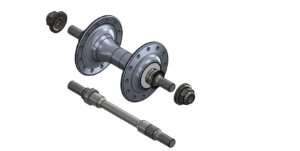
Solid axle steel M9x1 (standard):
For fastening with two M9x1 nuts with movable disk (included in the scope of delivery)
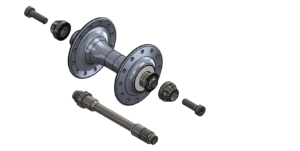
Solid axle steel M6:
For fastening with two M6 screws and suitable mount (not included in the scope of delivery)
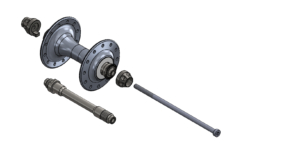
Hollow axle steel D5.2:
For fastening with an M5 screw + nut (not included in the scope of delivery)
Hollow axle aluminum light D5.2 / M6:
For fastening with an M5 screw + nut or alternatively two M6 screws with a suitable holder
(not included in the scope of delivery)
Rear wheel:
The mounting width on the rear wheel is 120 mmm.
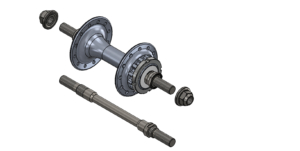
Solid axle steel M10x1
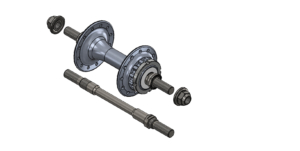
Solid axle steel tandem M10x1
(reinforced version for the tandem hubs with double bearing on the drive side)
The following options are available for our road bike hubs with brake disc:
Front wheel:
Thru axle 12×100 mm
Rear wheel:
Thru axle 12×142 mm
The following options are available for our gravel hubs:
Front wheel:
Thru axle 12×100 mm
Thru axle 15×100 mm (non-boost)
Quick release 5×100 mm
Rear wheel:
Thru axle 12×142 mm light
12×142 mm heavy duty thru axle (available soon)
Quick release 5×135 mm
The following options are available for our mountain bike hubs:
Front wheel:
Thru axle 15×100 mm (non-boost)
Thru axle 15×110 mm (Boost)
Rear wheel:
Thru axle 12×142 mm light
12×142 mm heavy duty thru axle (available soon)
Thru axle 12×148 mm light
Thru axle 12×148 mm heavy duty (available soon)
The following options are available for our road bike hubs with brake track:
Front wheel:
Quick release 5×100 mm
Rear wheel:
Quick release 5×130 mm
We offer various sprocket mounts for our track and fixie hubs.
Caution: If a sprocket with a flat thread is screwed onto the hub, this will damage the hub.
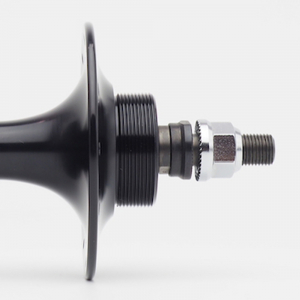
Continuous BSA thread 1.37″x24Tpi for use on the racetrack without lockring.

Continuous ITA thread M35x1 for use on the racetrack without lockring.
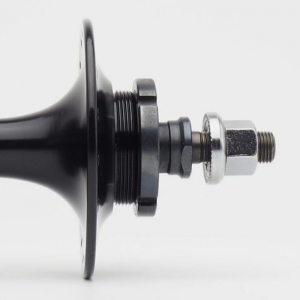
BSA thread 1.37″x24Tpi with thread length 6 mm and lockring to secure the sprocket.
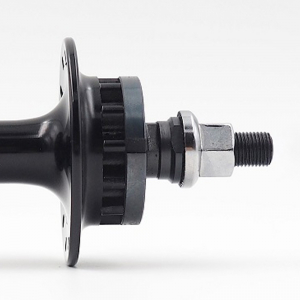
The sprocket is mounted via a form-fit polygon. This means that the hub does not have a thread for the sprocket. This means that no great effort is required to change the sprocket. The polygonal sprocket is simply slipped on and secured with the lockring.
This system was originally developed together with FES for use with the Tandem.
It is now our standard system and our recommendation for track and fixie wheels with lockring.
You can find the matching sprockets from 13-18 teeth in our store.

Continuous BSA thread 1.37″x24Tpi for mounting a standard freewheel for fixie.
The type of seal has an influence on smooth running and the service life of the ball bearings. We generally recommend the better sealed bearings (track: unsealed with cover washer, road/MTB: sliding seal).
For competition use in particular, however, it is worth opting for the less sealed version. Special care must be taken when maintaining the wheels and the bearings should be checked regularly and replaced if necessary in order to get the most out of the wheel.
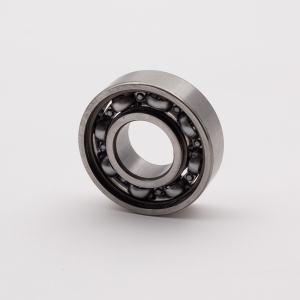
We install unsealed bearings as an option for track sports. In this case, the bearings can be lubricated directly when installed. It is also possible to drive with lubrication only.
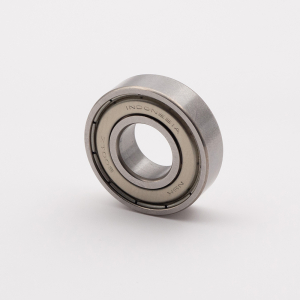
We install unsealed bearings with cover plates as standard in track sports.
The cover plate does not touch the inner ring, so there is no additional friction caused by the plate.
The bearings are greased. The cover plate serves as additional dust protection.
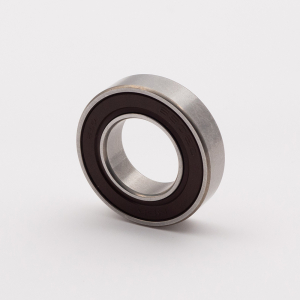
Bearings with an adjacent seal have less frictional losses through the seals and therefore run better, but are not quite as resistant to dirt or moisture.
We install these bearings in the HP version.
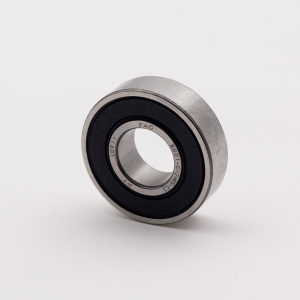
The sliding seal offers good protection against water and dirt. These bearings are fitted as standard for road, gravel and mountain bikes.
Our wheel hubs are available in the Heuer anodized colors black, red, blue and gold.
Due to the anodizing process, deviations from the colors shown are possible.
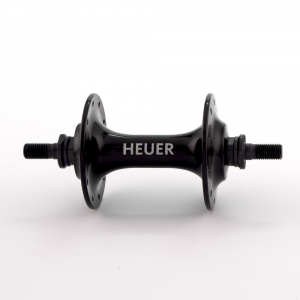
black anodized
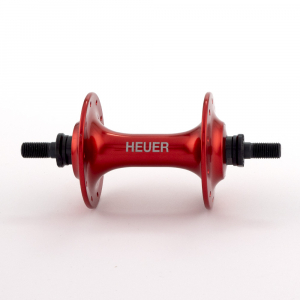
red anodized
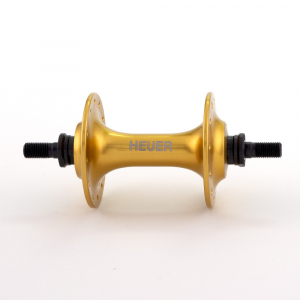
gold anodized
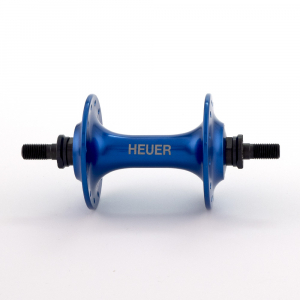
blue anodized
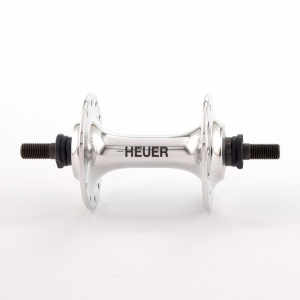
We also offer our wheel hubs in a polished version. Special care is required when using the wheels outdoors, as the unsealed aluminum can otherwise corrode.
There are many different freewheel systems in cycling.
With our range, we can serve all common freewheel standards.
Conversion kits for the various freewheel systems are available for all our Heuer hubs.
If you are unsure which freewheel is the right one for your bike, simply get in touch with us using the contact form or by phone.
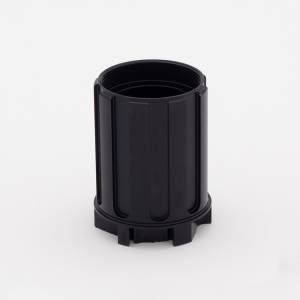
The Shimano HG11 freehub body can be used with 8- to 12-speed cassettes. A 1.8 mm adapter disk is sometimes required.
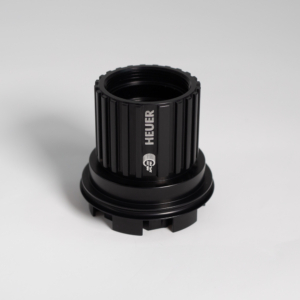
With the Shimano Micro Spline freehub system, 12-speed cassettes with a smallest sprocket of 10 teeth can be used. These are typically used in 1×12 mountain bike and gravel groupsets.
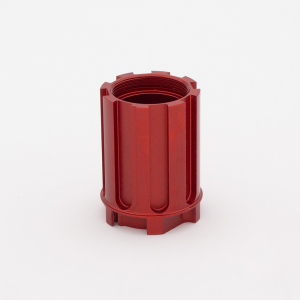
The Campagnolo freewheel can be used for Campagnolo road bike cassettes with 9-12 gears.
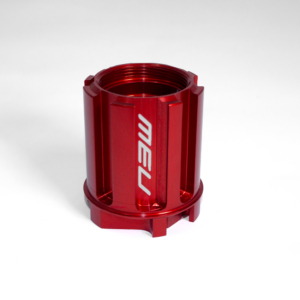
With the new Campagnolo N3W freehub standard, the N3W-specific cassettes can be used with up to 13 gears.
Older Campagnolo cassettes can also be used on this freewheel via an adapter kit.
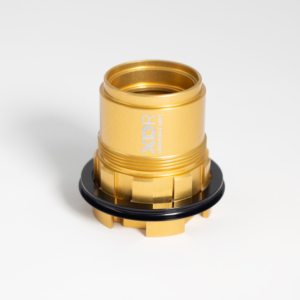
The SRAM XDR freewheel is suitable for road bike cassettes with XDR standard and up to 12 gears.
SRAM XD mountain bike cassettes can also be fitted using a 1.85 mm wide spacer.
The SRAM XD freehub is suitable for MTB cassettes with up to 12 gears.

Der Freilauf „Single-Free Polygon“ ist eine Eigenentwicklung von Heuer Radsport und wird für alle unsere Naben mit Freilauf und einem Gang eingesetzt (unter anderem Fixie mit Freilauf, BMX, Dirt).
Our Polygon sprockets with 13 to 18 teeth can be installed on the Polygon. These are available in the store for 3/32″ and 1/8″ chain widths: Sprocket - Sprocket Singlespeed Polygon
Our freewheels are available with different numbers of detent points per revolution.
We use two different toothing systems with 30 and 60 teeth.
The freewheels can be replaced as required, but must match the gearing. The gearing cannot be replaced in a used wheel.
In the top version, the 60-tooth freewheel comes with 120 clicks per revolution
We also offer a strong version for certain freewheels, which is particularly robust and therefore ideal for e-bikes. Here, 5 or 6 clicks are engaged simultaneously.
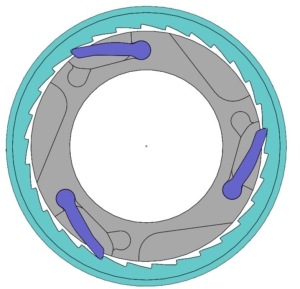
Z30 - Standard with 30 clicks per revolution
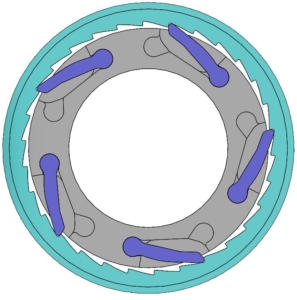
Z30 strong - 30 clicks per revolution with 5 clicks simultaneously in use
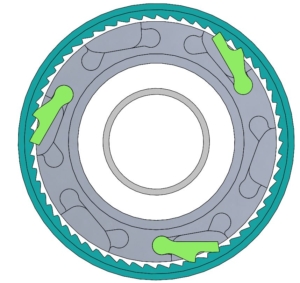
Z60 - Standard with 60 clicks per revolution
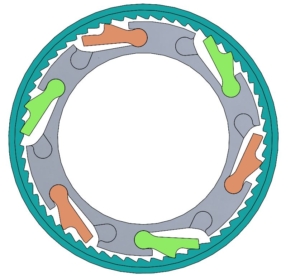
Z60 - 120 clicks per revolution: for particularly fast response
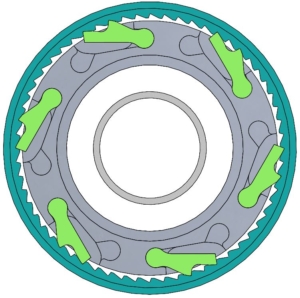
Z60 strong - 60 clicks per revolution with 6 clicks simultaneously in use
We offer all three rim profiles for our wheels. These are described in more detail below.
Tire pressure - probably the most important parameter for efficiency and safety
Tire pressure is an essential factor for the performance and safety of your bike. Paying close attention to these parameters is of the utmost importance. It is often a trade-off between optimum rolling resistance, improved grip, smooth handling and material protection.
The tire pressure is specified in bar or psi. 1 bar corresponds to approximately 14.5 psi.
The correct tire pressure ensures optimum rolling resistance. Lower pressure increases the contact area of the tire on the road, which can lead to increased rolling resistance, higher pressure can lead to improved control or a hard, uncomfortable ride. Heavier riders should increase the pressure slightly. The system weight, the tire width and the nature of the surface are the main parameters when choosing the pressure. The tire manufacturer's recommended specifications help when selecting the tire pressure. The maximum tire pressure, which is usually indicated on the tire sidewall, must not be exceeded.
Adequate tire pressure ensures sufficient grip on different road surfaces. This is particularly important when cornering and in wet conditions to prevent slipping. In wet or loose conditions, it is advisable to reduce the air pressure slightly to improve grip.
Please be sure to observe the maximum tire pressure specifications noted on the tire sidewall. Excessive pressure can not only lead to an uncomfortable ride, but can also damage the material of the tire and the rim.
The maximum pressure specifications for the respective rims must not be exceeded.
For rims with brake track, it must also be ensured that the air in the tire heats up when heat is introduced via the brake track, causing the pressure to rise. Hot brake track with increasing pressure leads to overloading of the system. The brake track can break and the tire can burst.
The specified pressures for rims must not be exceeded. Exceeding them can lead to material defects and personal injury.
TT stands for clincher with inner tube
TL stands for Tubeless with milk
Note:
We do not assume any warranty for the tightness of the tire with Tubless ready, as we have no influence on the quality. Please ensure that the sealing tape is checked regularly and that the tire fits properly.
| Tire width: | Inner rim width in mm: | max. pressure TT in bar/psi | max. pressure TL in bar/psi |
| 20 mm / 0.80 inch | 15 mm to 18 mm | 9.5 bar / 138 psi | 7.8 bar / 113 psi |
| 23 mm / 0.90 inch | 16 mm to 19 mm | 9.0 bar / 131 psi | 7.5 bar / 109 psi |
| 25 mm / 1.00 inch | 17 mm to 22 mm | 8.5 bar / 123 psi | 7.0 bar / 102 psi |
| 28 mm / 1.10 inch | 17 mm to 23 mm | 7.9 bar / 115 psi | 6.4 bar / 93 psi |
| 30 mm / 1.20 inch | 17 mm to 24 mm | 7.2 bar / 104 psi | 5.7 bar / 83 psi |
| 32 mm / 1.25 inch | 17 mm to 24 mm | 6.8 bar / 100 psi | 5.3 bar / 78 psi |
| 34 mm / 1.35 inch | 18 mm to 25 mm | 6.0 bar / 87 psi | 4.7 bar / 68 psi |
| 36 mm / 1.40 inch | 18 mm to 25 mm | 5.7 bar / 83 psi | 4.4 bar / 64 psi |
| 38 mm / 1.50 inch | 18 mm to 27 mm | 5.5 bar / 80 psi | 4.1 bar / 60 psi |
| 41 mm / 1.60 inch | 18 mm to 28 mm | 5.2 bar / 75 psi | 3.9 bar / 57 psi |
| 43 mm / 1.70 inch | 19 mm to 28 mm | 5.0 bar / 73 psi | 3.7 bar / 54 psi |
| 47 mm / 1.85 inch | 21 mm to 30 mm | 4.7 bar / 68 psi | 3.5 bar / 51 psi |
| 50 mm / 1.95 inch | 23 mm to 32 mm | 4.4 bar / 64 psi | 3.3 bar / 48 psi |
| 53 mm / 2.10 inch | 24 mm to 33 mm | 4.0 bar / 58 psi | 3.0 bar / 44 psi |
| 56 mm / 2.20 inch | 25 mm to 35 mm | 3.5 bar / 51 psi | 2.8 bar / 41 psi |
| 66 mm / 2.60 inch | 25 mm to 50 mm | 2.7 bar / 40 psi | 2.2 bar / 32 psi |
| 76 mm / 3.00 inch | 28 mm to 60 mm | 2.0 bar / 29 psi | 1.7 bar / 25 psi |
We recommend checking the tire pressure regularly and ensuring that it complies with the specifications. This not only guarantees optimum driving dynamics and safety, but also the longevity of your tires.
Please take these instructions to heart to ensure the full performance and safety of your bike.
Never exceed the maximum specified pressure of the tire or rim. Always select the maximum pressure of the lowest specification